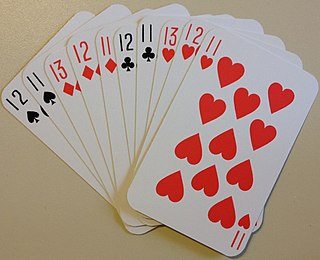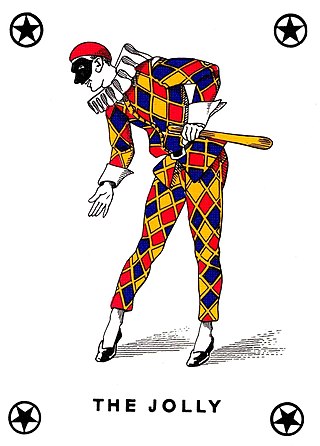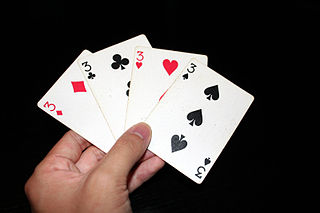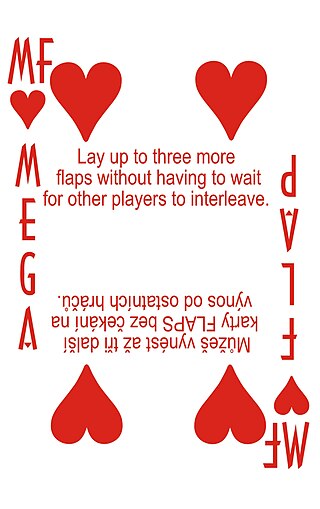
500 or Five Hundred is a trick-taking game developed in the United States from Euchre. Euchre was extended to a 10 card game with bidding and a Misere contract similar to Russian Preference, producing a cutthroat three-player game like Preference and a four-player game played in partnerships like Whist which is the most popular modern form, although with special packs it can be played by up to six players.

Black lady is an American card game of the hearts group for three to six players and the most popular of the group. It emerged in the early 20th century as an elaboration of hearts and was initially also called discard hearts. It is named after its highest penalty card, the queen of spades or "black lady". It is a trick-avoidance game in which the aim is to avoid taking tricks containing hearts or the black lady. American author and leading bridge exponent, Ely Culbertson, describes it as "essentially hearts with the addition of the queen of spades as a minus card, counting thirteen" and goes on to say that "black lady and its elaborations have completely overshadowed the original hearts in popularity".

Euchre or eucre is a trick-taking card game commonly played in Australia, Canada, Great Britain, New Zealand, and the Midwestern United States. It is played with a deck of 24, 28, or 32 standard playing cards. There are normally four players, two on each team, although there are variations for two to nine players.

Crazy Eights is a shedding-type card game for two to seven players and the best known American member of the Eights Group which also includes Pig and Spoons. The object of the game is to be the first player to discard all of their cards. The game is similar to Switch and Mau Mau.

Spades is a trick-taking card game devised in the United States in the 1930s. It can be played as either a partnership or solo/"cutthroat" game. The object is to take the number of tricks that were bid before play of the hand began. Spades is a descendant of the Whist family of card games, which also includes Bridge, Hearts, and Oh Hell. Its major difference as compared to other Whist variants is that, instead of trump being decided by the highest bidder or at random, the Spade suit always trumps, hence the name.

The Joker is a playing card found in most modern French-suited card decks, as an addition to the standard four suits. Since the second half of the 20th century, they have also been found in Spanish- and Italian-suited decks, excluding stripped decks.

Mau-Mau is a card game for two to five players that is popular in Germany, Austria, South Tyrol, the United States, Brazil, Greece, Czech Republic, Slovakia, Israel and the Netherlands. Mau-Mau is a member of the larger Crazy Eights or shedding family, to which the proprietary card game Uno belongs. However, Mau-Mau is played with standard French or German-suited playing cards.
Pedro is an American trick-taking card game of the All Fours family based on Auction Pitch. Its most popular variant is known as Cinch, Double Pedro or High Five which was developed in Denver, Colorado around 1885 and soon regarded as the most important American member of the All Fours family. Although it went out of fashion with the rise of Auction Bridge, it is still widely played on the western coast of the United States and in its southern states, being the dominant game in some locations in Louisiana. Forms of the game have been reported from Nicaragua, the Azores, Niobe NY, Italy and Finland. The game is primarily played by four players in fixed partnerships, but can also be played by 2–6 individual players.
Macau, also spelled Makaua or Macaua, is a shedding-type card game from Hungary, with similar rules to Crazy Eights or Uno and uses a standard 52 card deck. The object of the game is to be the first player to remove all cards from one's hand. Macau involves bluffing so that the players can save cards for later for a higher point value. Cheating is encouraged to add additional gameplay depth.
Pitch is the American name of the English trick-taking game of Blind All Fours which, in turn, is derived from classic All Fours. Historically, Pitch started as "Blind All Fours", a very simple All Fours variant that is still played in England as a pub game. The modern game involving a bidding phase and setting back a party's score if the bid is not reached came up in the middle of the 19th century and is more precisely known as Auction Pitch or Setback.

Craits is a shedding card game for two to five players. It was invented in the 1970s in Cambridge, Massachusetts, and is derived from Crazy Eights, which forms the origin of its name.

Daifugō or Daihinmin, also known as Tycoon, is a Japanese shedding-type card game for three or more players played with a standard 52-card pack. The objective of the game is to get rid of all the cards one has as fast as possible by playing progressively stronger cards than those of the previous player. The winner is called the daifugō earning various advantages in the next round, and the last person is called the daihinmin. In that following round, winners can exchange their one or more unnecessary cards for advantageous ones that losers have.

Switch is a shedding-type card game for two or more players that is popular in the United Kingdom, Ireland and as alternative incarnations in other regions. The sole aim of Switch is to discard all of the cards in one's hand; the first player to play their final card, and ergo have no cards left, wins the game. Switch is very similar to the games UNO, Flaps and Mau Mau, both belonging to the larger Crazy Eights or Shedding family of card games.

Continental Rummy is a progressive partnership Rummy card game related to Rumino. It is considered the forerunner of the whole family of rummy games using two packs of cards as one. Its name derives from the fact that it is played throughout the continental Europe, the United States, Mexico, Canada, and also in South America. According to Albert Morehead, it was "at one time the most popular form of Rummy in women's afternoon games, until in 1950 it lost out to Canasta."

Carioca is a Chilean card game similar to Rummy style card games with many variations. The variation described below is Perla's Cariocas.

Ninety-nine is a simple card game based on addition and reportedly popular among the Romani people. It uses one or more standard decks of Anglo-American playing cards in which certain ranks have special properties, and can be played by any number of players. During the game, the value of each card played is added to a running total which is not allowed to exceed 99. A player who cannot play without causing this total to surpass 99 loses that hand and must forfeit one token.
One-card is a shedding-type card game. The general principles put it into the crazy eights family. It is played with an ordinary poker deck and the objective is for a player to empty their own hand while preventing other players from emptying theirs. The game is commonly played in South Korea, Finland and The Netherlands.

Kalooki or Kaluki is a card game popularly played in Jamaica,. It is sometimes called Jamaican Rummy for similarities in structure the game bears with Contract Rummy or Gin Rummy. The games are, however, different and not to be confused.

Flaps is a commercial card game released in 1994, and is a shedding-type card game for two or more players. It is based on the game Crazy Eights, and uses a custom deck of playing cards with additional rules written in both English and Czech. The game has seven levels, each level adding new functionality.
Call-ace whist or Danish whist is a card game for four players playing in variable partnerships. It is the most popular form of Whist in Denmark, where it is often just called "Whist". It has a well developed bidding system and has imported from the traditional Danish game of Skærvindsel the feature of determining the partnerships by 'calling an ace'. John McLeod records that there is also a version of Danish whist in which there are fixed partnerships.













